Christian physicians’ conference gathers over 400 participants from 20 countries
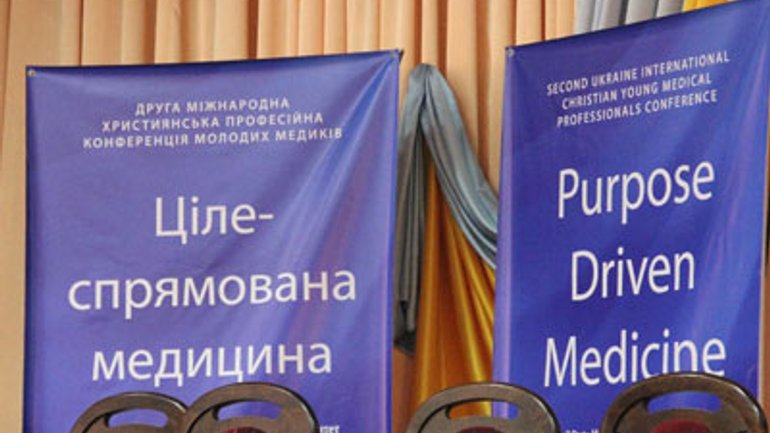
Such questions participants discussed at the international Christian scientific and practical conference that took place in Ternopil on October 29-30. It was attended by over 400 delegates, including medical students from Ukraine and foreigners who are studying in Ukraine, as well as speakers from the UK, USA, Canada, Netherlands, Serbia, Russia and Poland.
The conference was held under the patronage of the Horbachevsky Ternopil State Medical University supported by international organizations Partnership in International Medical Education (UK), Local Association (Ukraine–USA), Mission to the World (USA), International Christian Medical & Dental Association (South Africa). The organizers of the conference received letters of support from many politicians from different political parties, government officials, and Christian faiths. Representatives of the UGCC in the Ternopil region, evangelical churches, representatives of the youth organization Obnova, and others joined the event.
The conference was organized jointly by the Alliance of Christian Professionals, the Christian Medical Association of Ukraine, and the Ukrainian Medical Mission.
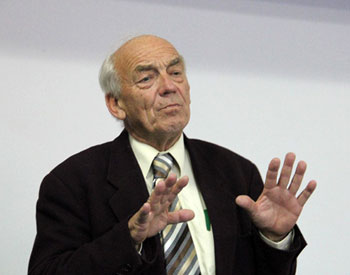 The speakers included professors from Oxford University, Royal College of Medicine of Great Britain and other British, American and European universities.
The speakers included professors from Oxford University, Royal College of Medicine of Great Britain and other British, American and European universities.
The aim of the conference was to gather young Christian physicians, both Ukrainians foreign citizens, to develop education in Ukraine, to give them practical knowledge in medicine using the principles of Christian doctrine and appropriate motivation, and help them grow professionally and spiritually.
Foreign medical students from almost all medical schools in Ukraine participated in the conference. About 25% of participants were Ukrainian students.
The leading theme of the conference was “Purpose Driven Medicine.” At the opening of the event, participants discussed the Christian principles of a physician’s service. Later, participants had the opportunity to gain practical knowledge and skills at workshops.
Speaking of the relationship between the spiritual and scientific components of the event, Rostyslav Semikov, coordinator of the Association of Christian Professionals, said:
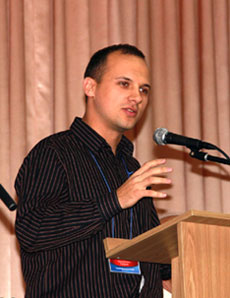 “In the beginning we talk about relationships with God, Christian principles of medical service, and then start seminars that give participants practical knowledge and skills. This approach to education I saw when I was at Oxford, and I really liked it. Now we try to use it in our conferences. Discussion of professional topics takes place in small groups – it encourages students to personally interact with lecturers, specialists. In addition, it helps young people to learn to think, ask questions, and seek answers, rather than get ready information that must be learned by heart. We are trying to introduce these innovations to our Christian professional environment in order to change it and bring biblical principles to professional circles, and from there to the whole society.”
“In the beginning we talk about relationships with God, Christian principles of medical service, and then start seminars that give participants practical knowledge and skills. This approach to education I saw when I was at Oxford, and I really liked it. Now we try to use it in our conferences. Discussion of professional topics takes place in small groups – it encourages students to personally interact with lecturers, specialists. In addition, it helps young people to learn to think, ask questions, and seek answers, rather than get ready information that must be learned by heart. We are trying to introduce these innovations to our Christian professional environment in order to change it and bring biblical principles to professional circles, and from there to the whole society.”
Overall, over the course of the two-day conference more than 50 different workshops that covered not only narrow medical topics but also complex issues of bioethics and professional ethics were held. The topics included the relationship between patients and physicians, palliative care, integrity of the profession, compassion for patients and others. The students were especially interested in topics that concerned the emotional component of the physician’s work, in particular, the question of psychology.
“No other profession offers such an opportunity for healing and hope. To be the best, physicians should consider the ‘whole person,’” said one of the co-organizers of the conference, the president of the Ukrainian Medical Mission, James Peipon.
Many of the speakers, professional foreign doctors, who conducted the workshops, worked for many years in Ukraine in the field of medicine and social work. Dr. Jeff Crane worked in Ukraine in 2007, starting a Christian ministry in health care and in orphanages. “I sincerely believe that a Christian doctor can professionally and properly exercise his faith in medical practice,” said Dr. Crane.
Professor Gil Odendaal, director of Global HIV/AIDS Initiative, a member of the International AIDS Conference in Mexico City (2008), spoke on the topics of prevention of AIDS and the stigmatization of AIDS patients, as well as the financial support of AIDS programs. At several of the seminars, the students were shocked by the statistics and facts provided by the professor.
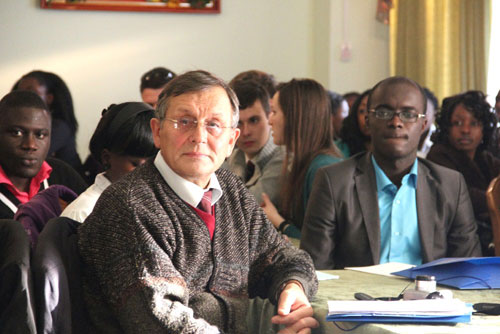
It should be noted that the organizers did not spend money for the participation of foreign lecturers – almost all of them arrived at their own expense to share their knowledge and experience with young colleagues from Ukraine.
Given that most foreign students in Ukrainian medical universities are immigrants from Africa and the Middle East, participants separately examined the problem of xenophobia. Yana Salakhova, representative of the International Organization for Migration (IOM) in Ukraine, told foreign students about the importance of protecting their rights in universities and dormitories, and what to do when these rights are violated.
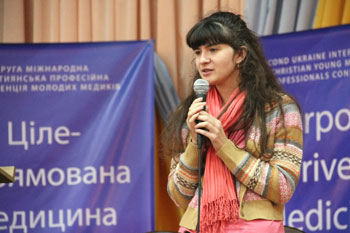 “Our organization monitors racially motivated attacks on foreigners, and in the past four years, 75 students were victims of such attacks, and this is a quarter of all recorded cases. There are also studies that indicate that 50% of foreign students face different forms of discrimination,” she said.
“Our organization monitors racially motivated attacks on foreigners, and in the past four years, 75 students were victims of such attacks, and this is a quarter of all recorded cases. There are also studies that indicate that 50% of foreign students face different forms of discrimination,” she said.
“The conference of foreign Christian physicians in Ternopil was the Christian Professionals Association Alliance’s largest event: in terms of the number of people who attended the conference and in terms of the geography of countries represented by participants and speakers,” William Lamptey, Deputy Chairman Medical Association for Foreign Students, told RISU.
After the conference there were several important events: the meeting of the organizers, speakers and delegates with the rector of the Ternopil National University, a roundtable with a teaching and professional staff, during which the application of Christian principles in the work of a physician was discussed, and a meeting of conference delegates with members of the university’s hospital. Following the conference, the parties agreed on the development of international cooperation between Ternopil State Medical University and medical schools in Brighton and Oxford. This cooperation will include the exchange of expertise and experts.









